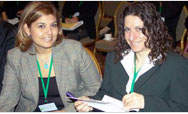USAID Africa Higher Education Summit Concludes With Success
FOR IMMEDIATE RELEASE
October 29, 2008
Press Office: 202-712-4320
Public Information: 202-712-4810
www.usaid.gov
WASHINGTON, D.C. -- The U.S. Agency for International Development (USAID) Africa Regional Higher Education Summit successfully concluded on Friday in Kigali, Rwanda. The President of the Rwanda Senate and Rwandan Ministers of Science and Technology, Education, and Finance participated in the three-day Summit, along with U.S. Secretary of Education Margaret Spellings, U.S. Chargé d'Affaires Cheryl Sim, and USAID Deputy Assistant Administrator for Africa Franklin Moore.
"With worldwide attention and resources devoted to achieving universal primary education, higher education must not be neglected," said Moore. "Enrollment in higher education institutions in Africa has increased significantly yet the infrastructure, materials, and number of trained faculty are inadequate to meet this demand. Through the Africa Summit, USAID hopes to foster partnerships that will meet the demand for skills and training in Africa and ensure that the growing youth population of the continent finds meaningful employment to support themselves and their families and be full and active participants in society."
More than 200 participants, representing 30 countries, gathered to discuss the role of higher education in strengthening Africa's economic growth and global competitiveness. Participants were from African and American Universities, foundations, non-governmental organizations, and the private sector. Public and private sector collaboration was a central theme throughout the Summit in presentations and structured networking sessions. The new relationships made and best practices shared at the Summit are already generating new ideas for capacity building and development in Africa and for meeting Africa's higher education challenges.
At the conclusion of the Summit, USAID and Global Relief and Development Partners signed a Memorandum of Understanding aimed at strengthening democracy and good governance in Rwanda, accelerating economic growth, and improving the well-being of all Rwandans. Specifically in the area of education and professional development, the new partnership is looking to provide on-line instruction for teachers and counselors, as well as training for professionals in the justice sector. These efforts will help enhance the human and institutional capacity of Rwanda and Rwandans, enabling them to pursue their personal and national development priorities.
In addition, USAID announced the development of a Rwanda Education Commons (REC). This project is in response to the Government of Rwanda's vision to utilize science, technology, and information communication technologies (ICT) to become a knowledge-based economy by 2020. The REC initially will focus on improving the quality of primary school teaching, providing access to on-line resources, teaching and learning support materials, and opportunities for professional development. The REC will also include off-line channels for distributing materials, particularly to teacher training colleges, and will explore the use of radio, satellite television, and mobile phone technology to supplement the online portal. A beta version of the REC is available through www.globaldevelopmentcommons.net. The Global Development Commons web site focuses on how information technology innovations can be applied in international development.
For more information about USAID and its education programs around the world, please visit www.usaid.gov.
The U.S. Agency for International Development has provided economic and humanitarian assistance worldwide for nearly 50 years.
Back to Top ^
|


